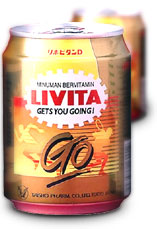Dear folks,
It has been a while since I updated my blog. But thanks to all who kept tuning in and showing your support! Life's getting more stressful as exams are nearing the corner. I've been having some mood swings due to stress :p Just ask those around me haha!
Not so much interesting things happening in my life right now. It's now time to eat right and sleep well. Here's a must-follow guide for a long life! These healthy, delicious foods are super-charged with important nutrients to help you live longer, and healthier:
YogurtDairy is often difficult to digest, but gentler yogurt is an easy way to get the calcium you need -- and more. One serving a day delivers a dose of healthy probiotics -- "good" bacteria that helps promote a balanced intestinal environment. "As we age," Moores says, "we can lose bacteria in our intestine, making it more difficult to prevent digestive diseases." The probiotics found in yogurt, namely acidophilus, serve as a natural defense against potentially harmful organisms. But all yogurt is not created equal: Read the container's nutrition label to ensure that the brand you choose contains active cultures.
Serving size: 1 cupCalorie count: 138Quick tip: Opt for plain, lower-fat yogurt, because the flavored varieties frequently contain added sugar.SalmonAs the anti-aging ambassador of marine cuisine, salmon has omega-3 fatty acids, essential fats that reduce inflammation in the body, warding off a laundry list of age-related ailments: arthritis, heart disease, high blood pressure, and more. Plus, "fish is brain food," proclaims Moores. Its oils have been shown to strengthen memory performance and decrease the slowing of mental faculties as we get older.
Serving size: 3-4 ouncesCalorie count: about 150Quick tip: Toss canned salmon over salad as you would with tuna.BlueberriesFor a fruit that is often marginalized to muffins, we are sorely overlooking this power berry. Blueberries are another essential "brain food," because they consist of loads of phytonutrients, or plant chemicals, recently touted for their role in preventing age-related neurological disorders. Moores advises, however, to head straight to the source -- consuming dietary supplements in place of the pure berry is not guaranteed to provide you with as many of its benefits, not to mention the fruit's tasty pleasures!
Serving size: 1/2 cupCalorie count: 40Quick tip: You can profit from blueberries year-round: There is no significant difference in the nutritional content of fresh, dried, or frozen berries.Red BeansAll beans are gold mines of age-defying nutrients, but research shows that red beans hoard the greatest amount of antioxidants -- key components in the quest for prolonged youth. These substances, such as vitamins D, E, and A, are believed to repair damaged cells in the body, and in doing so might avert the development of Alzheimer's disease, Parkinson's, and cancer. Red beans are also packed with another longevity champion -- folic acid -- a dementia preventative.
Serving size: 1/2 cupCalorie count: 310Quick tip: Opt for dried beans to get the most out of this legume; canned beans often contain too much salt.Flax SeedIt has been estimated that 30 to 40 percent of all cancers can be prevented by lifestyle and dietary measures alone, and flax is the gastronomic superstar of deterrence. The seed also promotes youthful, supple skin because of its high concentration of oils that, like salmon's omega-3s, lower the amount of inflammation in the body.
Serving size: 2 tablespoonsCalorie count: 118Quick tip: Sprinkle your daily serving of ground flax over cereal or oatmeal for an easy breakfast supplement.Quinoa"We tend not to eat as much when we consume foods that are high in fiber," says Moores, because they fill us up with fewer calories. The result? Consistently ingesting less helps us maintain a healthy weight and decreases our chances of developing diabetes. Light and fluffy quinoa (pronounced keen-wah) has the dynamite nutritional content of the healthiest grains, but it is actually a plant seed, and it's jam-packed with protein, iron, B vitamins, and minerals, too.
Serving size: 1/4 cup Calorie count: about 159 Quick tip: Instead of cooking quinoa in water, use low-sodium vegetable broth -- it will impart a rich flavor without adding fat.KaleAlthough often passed over in favor of its cousin cabbage, kale's crisp, dark leaves are bursting with micronutrients, potassium, and carotenoids, all essential for lowering risks of heart disease and even cataracts. Low-calorie kale is also calcium-rich, and its high concentration of vitamin A has been linked with a reduced incidence of cancer.
Serving size: 1 hearty cupCalorie count: about 34Quick tip: Combine steamed kale with something sweet, such as lightly sauteed onions, to offset its slightly bitter taste.Originally published on LHJ.com, February 2006.
Article obtained from
hereAs for me, I plan to incorporate those food as mentioned above into my diet, well most of them, except for those funny names I havent heard before.
Here's to long life!
 It was a bad bad bad bad day. I stepped out of the examination room feeling good as my first paper had been a breeze. Considering I didnt even study for that paper, I was confident of doing well. A question on TiVo came out in the exam. Do you know what's TiVo? Well, I wouldnt have known what it was, but I did, because I learned that from Sex and the City. Oh thank you, Miranda Hobbes, thank you for the extra marks I got from knowing what the hell is TiVo. I asked Fish if he knew what was Tivo, and he asked me if it means lesbian. Hahahaha it had me in stitches...
It was a bad bad bad bad day. I stepped out of the examination room feeling good as my first paper had been a breeze. Considering I didnt even study for that paper, I was confident of doing well. A question on TiVo came out in the exam. Do you know what's TiVo? Well, I wouldnt have known what it was, but I did, because I learned that from Sex and the City. Oh thank you, Miranda Hobbes, thank you for the extra marks I got from knowing what the hell is TiVo. I asked Fish if he knew what was Tivo, and he asked me if it means lesbian. Hahahaha it had me in stitches... friend in the computer lab where we snapped pictures of us making faces. Ok, those pictures turned out to be badly taken, but that's me, still looking happy. Boy, did I know that in 2 hours time, I would end my second paper practically in tears, and puking on the floor. This was a module I had to retake a second time this semester, and I had actually invested time in it, so fuck it. It sucks. Codes and hardware stuff turns me off, so yeah, leave those to the freaks and geeks.
friend in the computer lab where we snapped pictures of us making faces. Ok, those pictures turned out to be badly taken, but that's me, still looking happy. Boy, did I know that in 2 hours time, I would end my second paper practically in tears, and puking on the floor. This was a module I had to retake a second time this semester, and I had actually invested time in it, so fuck it. It sucks. Codes and hardware stuff turns me off, so yeah, leave those to the freaks and geeks.







